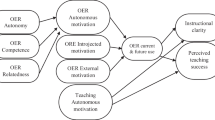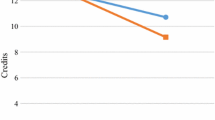Abstract
Many factors contribute to student success in college-level courses. One major factor is student access to required course materials. There is a growing number of students who, for several reasons, do not have access to materials or choose not to purchase textbooks. The negative impact of textbook cost is well known and documented and often a significant contributor to not purchasing course materials. In this paper, we explore the use of an inclusive textbook access program for several computer courses at a large community college. As part of this project, we present student feedback on this initiative and examine perceptions on textbook use and purchasing habits. The research helps gain insight into having the textbook built into the cost of the course and the impact of having access to a digital copy of the text on the very first day of class.
Access this chapter
Tax calculation will be finalised at checkout
Purchases are for personal use only
Similar content being viewed by others
References
Martin, M., Belikov, O., Hilton, J., Wiley, D., Fischer, L.: Analysis of student and faculty perceptions of textbook costs in higher education. Open Praxis 9(1), 79–91 (2017)
VitalSource: Study confirms costs lead students to forgo required learning materials; grades suffer as a result (2017). https://press.vitalsource.com/study-confirms-costs-lead-students-to-forgo-required-learning-materials-grades-suffer-as-a-result
Maloy, J., Fries, L., Laski, F., Ramirez, G.: Seductive details in the flipped classroom: the impact of interesting but educationally irrelevant information on student learning and motivation. CBE—Life Sci. Educ. 18(3), ar42 (2019)
Whitford, E.: Textbook trade-offs. Inside Higher Ed (2018). https://www.insidehighered.com/news/2018/07/26/students-sacrifice-meals-and-trips-home-pay-textbooks
Liberatore, M.: High textbook reading rates when using an interactive textbook for a Material and Energy Balances course. Chem. Eng. Educ. 51(3), 109–118 (2017)
Ruth, D.: OpenStax textbooks now available through bookstore digital access programs (2017). https://openstax.org/blog/openstax-textbooks-now-available-through-bookstore-digital-access-programs
McKenzie, L.: The true cost of inclusive access. Inside Higher Ed (2019). https://www.insidehighered.com/news/2019/02/05/college-hot-water-over-inclusive-access-programs-and-student-choice
Indiana University: Indiana University’s eText program saves students over $3.5 million (2017). https://itnews.iu.edu/articles/2017/indiana-universitys-etext-program-saves-students-over-3.5-million.php
Senack, E., Donoghue, R.: Covering the cost: why we can no longer afford to ignore high textbook prices. Student Organizing, Inc.- Covering the Cost (2016). https://www.luminafoundation.org/wp-content/uploads/2017/08/covering-the-cost.pdf
Jensen, K., Nackerud, S.: The evolution of affordable content efforts in higher education: programs, case studies, and examples (2018). https://doi.org/10.24926/86666.0101
CCBC Bookstore. https://www.ccbcmd.edu/Resources-for-Students/Bookstore.aspx
Erhorn, S., Frazee, J., Summer, T., Pastor, M., Brown, K., Cirina-Chiu, C.: SDSU’s immediate access program: providing affordable solutions [PowerPoint slides] (2017). https://slideplayer.com/slide/12799931/
Ruel, C.: How inclusive access purchasing programs can lower the cost of higher education (2017). https://hub.wiley.com/community/exchanges/educate/blog/2017/01/12/how-inclusive-access-purchasing-programs-can-lower-the-cost-of-higher-education-and-more
Vincenti, G., Hilberg, J.S., Braman, J.: Student preferences for consuming supplemental instructional material in CS0/CS1/CS2 courses. In: Proceedings of the 26th International Conference of the Society for Information Technology and Teacher Education (SITE), Las Vegas, Nevada USA (2015)
Author information
Authors and Affiliations
Corresponding authors
Editor information
Editors and Affiliations
Rights and permissions
Copyright information
© 2021 Springer Nature Switzerland AG
About this paper
Cite this paper
Clements, M., Braman, J. (2021). Exploring Factors of an Inclusive Textbook Access Program in Computer Technology Courses. In: Meiselwitz, G. (eds) Social Computing and Social Media: Applications in Marketing, Learning, and Health. HCII 2021. Lecture Notes in Computer Science(), vol 12775. Springer, Cham. https://doi.org/10.1007/978-3-030-77685-5_15
Download citation
DOI: https://doi.org/10.1007/978-3-030-77685-5_15
Published:
Publisher Name: Springer, Cham
Print ISBN: 978-3-030-77684-8
Online ISBN: 978-3-030-77685-5
eBook Packages: Computer ScienceComputer Science (R0)




